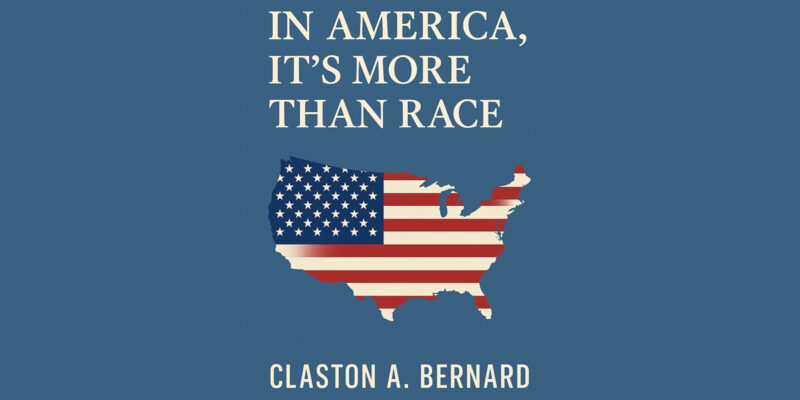What does it mean to be Black? Can the term be defined without invoking skin color, ancestry percentages, or the very rules that were designed to divide us? More importantly, does it serve any purpose in a nation founded on the belief that all men are created equal?
This is not just a theoretical question. It is a pressing one—philosophical, moral, and national in scope. If we are serious about preserving the American Republic and healing the fractures that plague our public discourse, we must confront the foundational myths that continue to divide us. The idea of race, and specifically Blackness, is one of them.
One Blood, One Race
Scripture teaches that God made man in His image (Genesis 1:27) and that He has made of one blood all nations of men (Acts 17:26). That means we are not separate species or fundamentally distinct categories. We are one human race.
This is not just a biblical truth—it is biological fact. The Human Genome Project confirmed that humans are 99.9 percent genetically identical. The minor differences that do exist are geographic and environmental, not racial. A dark skinned man from West Africa may share more genetic markers with a man from South Asia than with another African from the same continent.
In truth, race is not a scientific category. It is a social invention. And like many inventions, it was designed with a purpose. In this case, that purpose was to divide.
Slavery Was Evil—But Not Unique
It is impossible to defend the horrors of the transatlantic slave trade or the brutal system of hereditary chattel slavery that followed. But it is also important to remember that slavery was not racially unique.
European indentured servants—especially the Irish, Scottish, and English poor—were subjected to forced migration, hard labor, and dehumanization. In the early American colonies, mortality rates were comparable or even higher for indentured whites than for African slaves on the Middle Passage. Both groups were stripped of identity—Africans of tribal names and customs, Europeans of their heritage and culture.
The suffering was not racially exclusive. It was human suffering, and any attempt to define a racial identity around that suffering risks reinforcing the very system that created the division in the first place.
Blackness Was Constructed to Divide
The word “Black” was not created to uplift. It was created to classify and control. After Bacon’s Rebellion in 1676, when poor whites and African laborers united against the colonial elite, the ruling class responded by instituting rigid racial codes. This was the origin of race-based slavery and of Blackness as a legal category.
The infamous One Drop Rule—enshrined in laws like Virginia’s 1924 Racial Integrity Act—codified that anyone with any trace of African ancestry was considered Black. It was not about culture or self-identification. It was about control.
The term Black erased the identities of people from dozens of African ethnicities—Yoruba, Igbo, Mandinka, and many more—and replaced them with a color label rooted in legal and social inferiority.
That is the origin of Blackness. No matter how one tries to redefine it, this legacy cannot be erased.
Voluntary Blackness Is Still a Trap
Some argue that Blackness today is a chosen identity rooted in pride, culture, and shared experience. But even when embraced voluntarily, it remains trapped in the framework created by the oppressor.
You can put new paint on an old cage, but it is still a cage.
Whether through music, vernacular, historical memory, or fashion, attempts to define Blackness still operate under the same assumption—that people with a certain skin tone or ancestral history belong in a separate category. That assumption is the very heart of bigotry.
The Only Identity That Matters: American
If the United States is to be a unified Republic, then the only civic identity that holds any coherent meaning is “American.” Not African American. Not White American. Not Black American. Just American.
This is not about erasing culture. It is about rejecting the racial lens that sees skin color as destiny. Cultural expressions—whether food, dialect, or music—are shaped by geography, family, and faith, not race. They are American experiences.
When we focus on race, we divide the country and distract from the real issues—poverty, crime, education, moral decay—that affect all Americans regardless of skin tone.
The Inescapable Truth
Here is the truth: Blackness cannot be defined without bigotry because the term was created by bigots for the purpose of enforcing division. It cannot be redeemed by good intentions or voluntary pride. It is a term forged in the furnace of racial caste and legal suppression.
You cannot define it biblically. You cannot define it biologically. You cannot define it historically without referencing the very system that erased African diversity and separated humanity into invented racial categories.
We are one blood. One race. One nation—or at least we should be.
So the question remains: Why are we still using a word that was never meant to unite?
Claston A. Bernard is a Jamaican American immigrant, Olympian, and author of In America, It’s More Than Race. He writes on faith, culture, and the American Republic.
Advertisement
Advertisement

